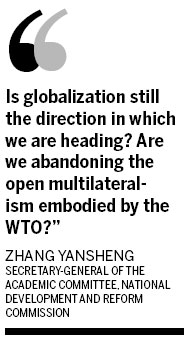

Should China join the talks on the Trans-Pacific Partnership? The old debate seems to have regained momentum.
In a May visit to Japan, United States Undersecretary of Commerce for International Trade Francisco Sanchez said the US would welcome China joining the TPP.
In response, China's Ministry of Commerce said China will analyze the possibilities of joining the pact and assess the pros and cons based on research and the principles of equality and mutual benefit.
The ministry said China, which has attached importance to the TPP talks, has been soliciting the opinions of various government departments and industries on the trade pact.
But sources in the Ministry of Commerce told China Daily that China is becoming "positive" toward the US-led Trans-Pacific free trade agreement. A consensus has been reached on the importance of the free trade pact, a step forward from some time ago, when many people were opposed to the proposal.
The US launched the TPP in 2010 in an attempt to strengthen trade relations with the Asia-Pacific region.
In April, participating countries approved Japan joining the TPP talks. Eleven nations are involved, including Canada, Peru, Chile, Vietnam and New Zealand.
Although none of the experts interviewed by China Daily were against involvement in the negotiations, some questioned the integrity of the US' push for the partnership, and others wondered whether China could soon meet the standards of the pact.
Steve Orlins, who heads the National Committee on United States-China Relations, favors China's accession to the TPP. Speaking at the recent Third Global Think Tank Summit held in Beijing, Orlins cited the history of China's accession to the World Trade Organization to illustrate the importance of "trying the unthinkable".
Differing opinions
He said China's accession to the WTO has had two major results. First, it served as a base for China's domestic reform. Second is the enormous growth of global trade.
"Now it comes to the TPP. People in the US said, don't try because it will only lead to disappointment What I'm seeing is more receptivity to the possibility of China entering the negotiations.
"Is it going to be easy? No. It is going to be really, really hard. But does that mean we shouldn't try? My response is let's try because we've been through this before," Orlins said.

But Zhang Yansheng, secretary-general of the Academic Committee of the National Development and Reform Commission, expressed reservations at the same panel.
He argued that the circumstances prevailing when China prepared to join the WTO were very different from those now.
"We were very sure that China wanted to participate in globalization. Joining the WTO was the chance. We were also quite sure that China wanted to adjust itself to international business norms," said Zhang.
"Now the US is pushing for the TPP, as well as the Transatlantic Trade and Investment Partnership with the European Union. Is it launched for China's new round of reform?" he asked.
He said there are voices in the West doubting whether globalization, launched by the West, really served the West's interests.
After all, China has jumped from being the seventh-largest economy before entering the WTO to the second spot now. Its foreign trade now represents more than 10 percent of the global total.
 Models at Ford pavilion at Chengdu Motor Show
Models at Ford pavilion at Chengdu Motor Show
 Brilliant future expected for Chinese cinema: interview
Brilliant future expected for Chinese cinema: interview
 Chang'an launches Eado XT at Chengdu Motor Show
Chang'an launches Eado XT at Chengdu Motor Show
 Hainan Airlines makes maiden flight to Chicago
Hainan Airlines makes maiden flight to Chicago
 Highlights of 2013 Chengdu Motor Show
Highlights of 2013 Chengdu Motor Show
 New Mercedes E-Class China debut at Chengdu Motor Show
New Mercedes E-Class China debut at Chengdu Motor Show
 'Jurassic Park 3D' remains atop Chinese box office
'Jurassic Park 3D' remains atop Chinese box office
 Beauty reveals secrets of fashion consultant
Beauty reveals secrets of fashion consultant